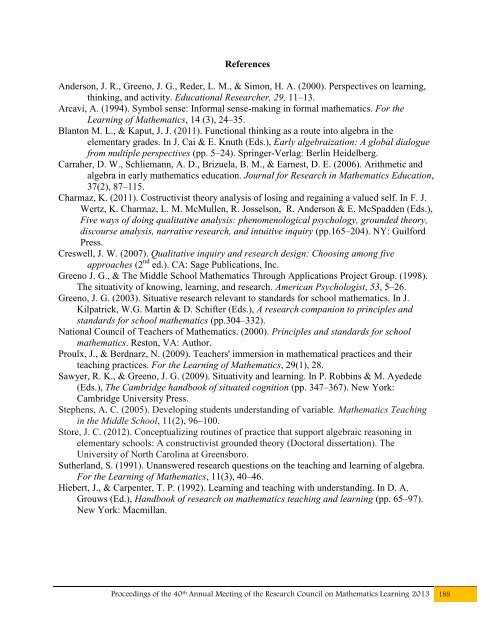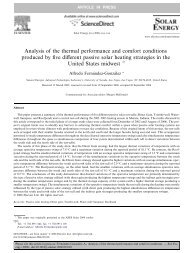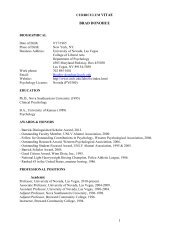2013 Conference Proceedings - University of Nevada, Las Vegas
2013 Conference Proceedings - University of Nevada, Las Vegas
2013 Conference Proceedings - University of Nevada, Las Vegas
- No tags were found...
Create successful ePaper yourself
Turn your PDF publications into a flip-book with our unique Google optimized e-Paper software.
ReferencesAnderson, J. R., Greeno, J. G., Reder, L. M., & Simon, H. A. (2000). Perspectives on learning,thinking, and activity. Educational Researcher, 29, 11–13.Arcavi, A. (1994). Symbol sense: Informal sense-making in formal mathematics. For theLearning <strong>of</strong> Mathematics, 14 (3), 24–35.Blanton M. L., & Kaput, J. J. (2011). Functional thinking as a route into algebra in theelementary grades. In J. Cai & E. Knuth (Eds.), Early algebraization: A global dialoguefrom multiple perspectives (pp. 5–24). Springer-Verlag: Berlin Heidelberg.Carraher, D. W., Schliemann, A. D., Brizuela, B. M., & Earnest, D. E. (2006). Arithmetic andalgebra in early mathematics education. Journal for Research in Mathematics Education,37(2), 87–115.Charmaz, K. (2011). Costructivist theory analysis <strong>of</strong> losing and regaining a valued self. In F. J.Wertz, K. Charmaz, L. M. McMullen, R. Josselson, R. Anderson & E. McSpadden (Eds.),Five ways <strong>of</strong> doing qualitative analysis: phenomenological psychology, grounded theory,discourse analysis, narrative research, and intuitive inquiry (pp.165–204). NY: GuilfordPress.Creswell, J. W. (2007). Qualitative inquiry and research design: Choosing among fiveapproaches (2 nd ed.). CA: Sage Publications, Inc.Greeno J. G., & The Middle School Mathematics Through Applications Project Group. (1998).The situativity <strong>of</strong> knowing, learning, and research. American Psychologist, 53, 5–26.Greeno, J. G. (2003). Situative research relevant to standards for school mathematics. In J.Kilpatrick, W.G. Martin & D. Schifter (Eds.), A research companion to principles andstandards for school mathematics (pp.304–332).National Council <strong>of</strong> Teachers <strong>of</strong> Mathematics. (2000). Principles and standards for schoolmathematics. Reston, VA: Author.Proulx, J., & Berdnarz, N. (2009). Teachers' immersion in mathematical practices and theirteaching practices. For the Learning <strong>of</strong> Mathematics, 29(1), 28.Sawyer, R. K., & Greeno, J. G. (2009). Situativity and learning. In P. Robbins & M. Ayedede(Eds.), The Cambridge handbook <strong>of</strong> situated cognition (pp. 347–367). New York:Cambridge <strong>University</strong> Press.Stephens, A. C. (2005). Developing students understanding <strong>of</strong> variable. Mathematics Teachingin the Middle School, 11(2), 96–100.Store, J. C. (2012). Conceptualizing routines <strong>of</strong> practice that support algebraic reasoning inelementary schools: A constructivist grounded theory (Doctoral dissertation). The<strong>University</strong> <strong>of</strong> North Carolina at Greensboro.Sutherland, S. (1991). Unanswered research questions on the teaching and learning <strong>of</strong> algebra.For the Learning <strong>of</strong> Mathematics, 11(3), 40–46.Hiebert, J., & Carpenter, T. P. (1992). Learning and teaching with understanding. In D. A.Grouws (Ed.), Handbook <strong>of</strong> research on mathematics teaching and learning (pp. 65–97).New York: Macmillan.<strong>Proceedings</strong> <strong>of</strong> the 40 th Annual Meeting <strong>of</strong> the Research Council on Mathematics Learning <strong>2013</strong> 188




